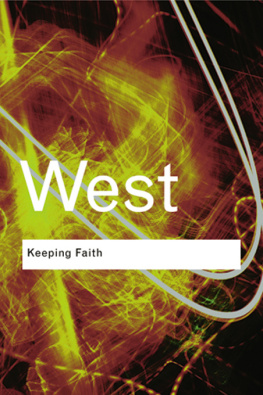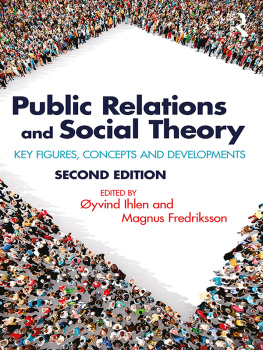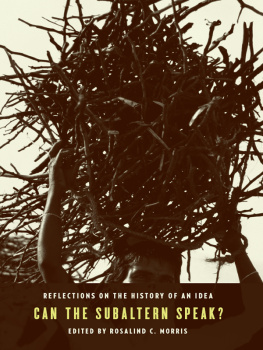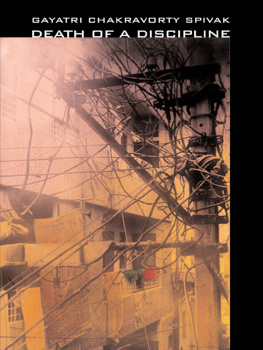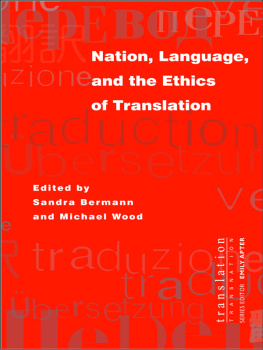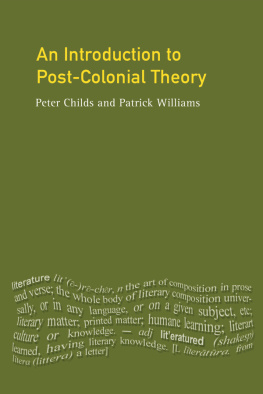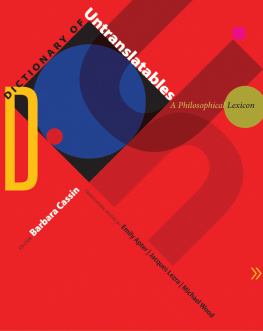
In Other Worlds
Gayatri Spivaks In Other Worlds is admirably intellectually honest.
National Review
A celebrity in academia [Spivak] creates a stir wherever she goes.
The New York Times
Always challenging and brilliantly argued, these essays deserve careful thought.
Journal of Modern Literature

Routledge Classics contains the very best of Routledge publishing over the past century or so, books that have, by popular consent, become established as classics in their field. Drawing on a fantastic heritage of innovative writing published by Routledge and its associated imprints, this series makes available in attractive, affordable form some of the most important works of modern times.
For a complete list of titles visit
www.routledgeclassics.com
Gayatri Chakravorty
Spivak
In Other Worlds
Essays in cultural politics
With a new introduction by the author

First published 1998
by Routledge
2 Park Square, Milton Park, Abingdon, Oxon OX14 4RN
Simultaneously published in the USA and Canada
by Routledge
711 Third Avenue, New York, NY 10017
Routledge is an imprint of the Taylor & Francis Group, an informa business
1987 by Methuen, Inc
Introduction to the Routledge Classics edition 2006
Gayatri Chakravorty Spivak
Typeset in Joanna by RefineCatch Limited, Bungay, Suffolk
All rights reserved. No part of this book may be reprinted
or reproduced or utilized in any form or by any electronic, mechanical, or other means, now known or hereafter invented, including photocopying and recording, or in any information storage or retrieval system, without permission in writing from the publishers.
British Library Cataloguing in Publication Data A catalogue record for this book has been applied for A catalogue record for this book is available from the British Library
Library of Congress Cataloging in Publication Data
ISBN10: 0415389569
ISBN13: 9780415389563
For Michael
CONTENTS
PART III Entering the Third World
INTRODUCTION TO THE ROUTLEDGE CLASSICS EDITION
It was William Germano, then editor at Methuen, who gave me the courage to publish the collection of essays that became In Other Worlds. He gave it the subtitle essays in cultural politics and made me realize the direction my work was taking. It is a direction I still follow. I am still working at the politics of the production of culture, especially as it is being offered as a panacea for the ills of globalization.
When I began the first essays in the book, news of the culture wars had not yet reached the University of Iowa, where I taught from 1965 to 1977, and the University of Texas, where I taught from 1978 to 1982. Letter as Cutting Edge was written for my dissertation director, Professor Paul de Man. Again, what I offered in the reading that the great Romantic poet and critic Samuel Taylor Coleridge staged the inaccessibility of the imagination to codification has not left me yet. In Death of a Discipline, published twenty six years after, I read Virginia Woolf staging a version of that very scenario in A Room of Ones Own. And this unmanageable thing, the imagination, has become something like an ethical instrument for me. Terry Eagleton cautioned me recently that the European eighteenth century idea that the imagination could help us enter others minds came to nothing. I agree. The imagination has become, for me, little more than the ability to think what is not there. It is what you use and train when you try to learn a language, enter its lingual memory (A. L. Becker) so that you can move within it.
The Dante and Woolf pieces came out of a class I taught at a summer school at the University of Texas in 1978. I was in the first phase of my feminism then, looking at great texts to see how they could help us become gender-sensitive. The only thing that has changed over the intervening years is that feminism has become multiple-issue. I now think reproductive heteronomrativity is the broadest and oldest institution in the world. These two essays would still fit in.
I have a soft corner for the Wordsworth piece. It is the elaboration of a paper I wrote for M. H. Abramss undergraduate course at Cornell, Masterworks of Romantic Literature, in 1961, my first semester out of India. It is a tribute, therefore, to my teachers at the University of Calcutta. I hope it will be an incentive to my student readers.
With the last essay in that section I am entering the culture wars. In the book I call it, simply, the world. In 197778, I spent some time as a National Humanities Fellow at the University of Chicago and that threw me in with a worldlier crowd. Indeed, The Politics of Interpretation is the account of a conference there.
French Feminism in An International Frame and Draupadi reflect the beginning, for me, of something that was later called postcolonialism. It was 1981. I had been asked by Yale French Studies to write on French Feminism and by Critical Inquiry to write on deconstruction. I had a crisis of conscience and those two essays were the result. I had gone clear past the culture wars a Euro-US phenomenon which is why I never quite became as popular as my friend Homi K. Bhabha. I was looking forward to Three Womens Texts and A Critique of Imperialism and Can the Subaltern Speak? essays that found their way into A Critique of Postcolonial Reason (1999).
In 1984 I met Ranajit Guha, the leader of the South Asian historians collective called Subaltern Studies. The last three pieces in the book come from that turbulent association. I am still on the track of the subaltern. Subaltern is to popular as gender is to sex, class to poverty, state to nation, I wrote a few weeks ago.
Scattered Speculations on the Question of Value is the wild card in the collection. In 1978 I taught my first course on Marx. I repeat that course every three years or so. Value has simplified itself into commensurability now. I have written many pieces on Marx, too many to list here. A book on the possibility of socialist ethics has been brewing in my mind for all these years. That book changes its shape under my feet as history writes itself a present. I hope those of you who read this book will look out for that other one, as do I.
GAYATRI CHAKRAVORTY SPIVAK
Columbia University
FOREWORD
Gayatri Spivak is often called a feminist Marxist deconstructivist. This might seem a rebarbative mouthful designed to fit an all purpose radical identity. To any reader of this remarkable book it will come to seem a necessarily complex description, limning not an identity, but a network of multiple contradictions, traces, inscriptions. The book does not merely state that we are formed in constitutive contradictions and that our identities are the effects of heterogenous signifying practices: its analyses start from and work towards contradiction and heterogeneity. Illumination is a necessarily transitory and conjunctural moment. Any foreword to this work is, of necessity, asked to address the three fields of feminism, Marxism, and deconstruction. However, much of the force of Spivaks work comes from its reiterated demonstration that these fields can only be understood and used in a constant attention to their interpenetration and re-articulation. Any simplifying foreword thus runs the risk of reducing the potential of this productive work. The task is, however, worth undertaking exactly because these texts are of importance to anyone concerned with our understanding of culture. Better: with the relation both of culture and its interpretation to the other practices that shape our lives.
Next page
